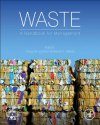![Waste: A Handbook for Management Waste: A Handbook for Management]()
Click to have a closer look
About this book
Contents
Biography
Related titles
About this book
This volume focuses on all of the main areas including household waste (compostable material, paper, glass, textiles, household chemicals, plastic, water, and e-waste), industrial and societal waste (metals, building, tires, medical battery, hazardous mining, nuclear, ocean, military, and space), and the future of landfills and incinerators.
In addition to a comprehensive coverage of waste, this book suggests the best ways of managing the problems and offers scientific and non-biased overviews to ensure credibility in the environmental science and engineering communities.
Contents
1. A History of Waste Management
2. Green Engineering and Sustainable Design Aspects of Waste Management
3. Waste Regulations with special emphasis to the USA
4. Waste Collection
5. Mine Waste: A Brief Overview of Origins, Quantities and Methods of Storage
6. Metal Waste
7. Radioactive Waste Management
8. Municipal Waste Management
9. Waste Water: Reuse of Oriented Wastewater - Low- and High-Tech Approaches for Urban Areas
10. Recovered Paper
11. Glass Waste
12. Textile Waste
13. Chemicals in Waste: Household Hazardous Waste
14. Reusing Non-hazardous Industrial Waste across Business Clusters
15. Construction Waste
1. 16.Thermal Waste Treatment
16. Plastic solid waste (PSW) and thermo-chemical treatment
17. Air pollution (including pollution due to Coal and Oil Burning, Cement Making and Automobile exhaust pollution
18. Ocean pollution
19. Electronic Waste
20. Tyres
21. Battery Waste
22. Medical waste
23. Agricultural Waste and Pollution
24. Military waste
25. Space waste
26. Hazardous Wastes
27. Land Pollution
28. Thermal Pollution
29. Landfills, Yesterday, Today and Tomorrow
30. Pollution Management and Responsible Care
31. Risk Assessment, Management and Accountability
Epilogue
Index
Customer Reviews
Biography
Dan Vallero is an internationally recognized expert in the transport, chemical transformation and environmental fate of hazardous pollutants. His three decades of professional experience in hazardous waste engineering and management have included research, teaching and regulatory advice related to a wide range of human health risk and ecological issues, from global climate change to the release of hazardous products of incomplete combustion from waste incinerators to the assessment of the risks from exposures to environmental endocrine disruptors. Dr. Vallero recently established the Engineering Ethics program at Duke University. This innovative program introduces students to the complex relationships between science, technology and societal demands on the engineer. The lessons learned from the cases in this book are a fundamental part of Duke's preparation of its future engineers to address the ethical dilemmas likely to be encountered during the careers of the next generation engineers.



































